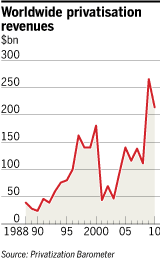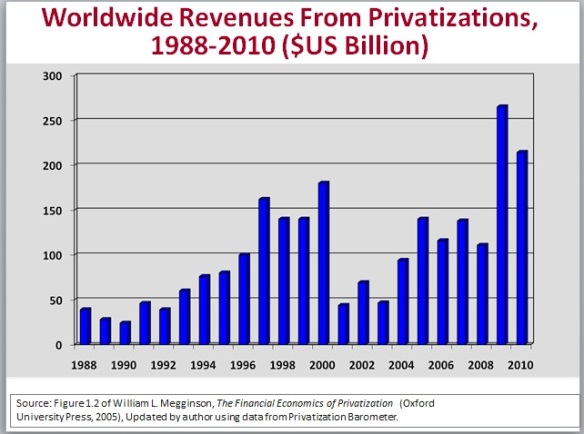According to FT.com, privatisation is again sweeping the world:
…with governments hauling in a record $213bn in revenues last year in a massive sale of everything from ports to phones and gambling companies to gas groups.
The trend looks set to continue globally this year with another $150bn on the block so far, suggesting that revenues from privatisation will near the 2010 figure, the highest achieved since governments began offloading assets three decades ago.

Large deals on the table include the $6.3bn auction of Polkomtel, the Polish mobile phone operator, and Mongolia’s 30 per cent IPO of a stake in the mining company Erdenes Tavan Tolgoi, expected to raise as much as $2bn.
The figures have been bolstered by the offloading of stakes acquired in government rescues throughout the financial crisis.
The biggest privatisation this year is expected to be the US Treasury’s estimated $15bn sale of shares in Ally Financial, General Motors’ financial arm, bought when the car manufacturer was bailed out in 2009.
Although revenues from asset sales were technically higher in 2009 than in 2010, almost two-thirds of those sales involved bank repurchases of mostly preferred stock that were acquired through government bail-outs during the financial crisis, according to William Megginson, professor at the University of Oklahoma.
Last year, governments sought to devolve responsibility for infrastructure and assets in almost every political system and country.
Significant deals included Agricultural Bank of China’s $22.1bn IPO, the largest stock offering in history.
The 27 EU nations have traditionally been slow to privatise but with sell-offs a condition of bail-outs, Spain, Poland, Portugal and Greece are set to unleash a wave of asset sales.
There were several big infrastructure sales last year but many of the deals involved the sale of long-term contracts rather than entire assets. For example, the Queensland state government auctioned the right to operate the Port of Brisbane for 99 years.
The Chinese, Indian and Polish governments were involved in a number of sell-offs, partly aimed at promoting their capital markets. But the government retains a controlling stake in deals such as AgBank’s.
New Zealand governments have stood out from these worldwide trends for over a decade. In this they were joined only by a handful of countries like North Korea and Myanmar. I know of no other centre-left party that has adopted the anti-privatisation polices of New Zealand Labour. It is pleasing that the government is seeking a mandate to resume a privatisation programme at the forthcoming election.
Professor William Megginson, a leading authority on privatisation, will be presenting on the subject at a CEO Forum to be held at the Business Roundtable’s offices at 5.30 pm on 8 August. Expressions of interest are welcome.


